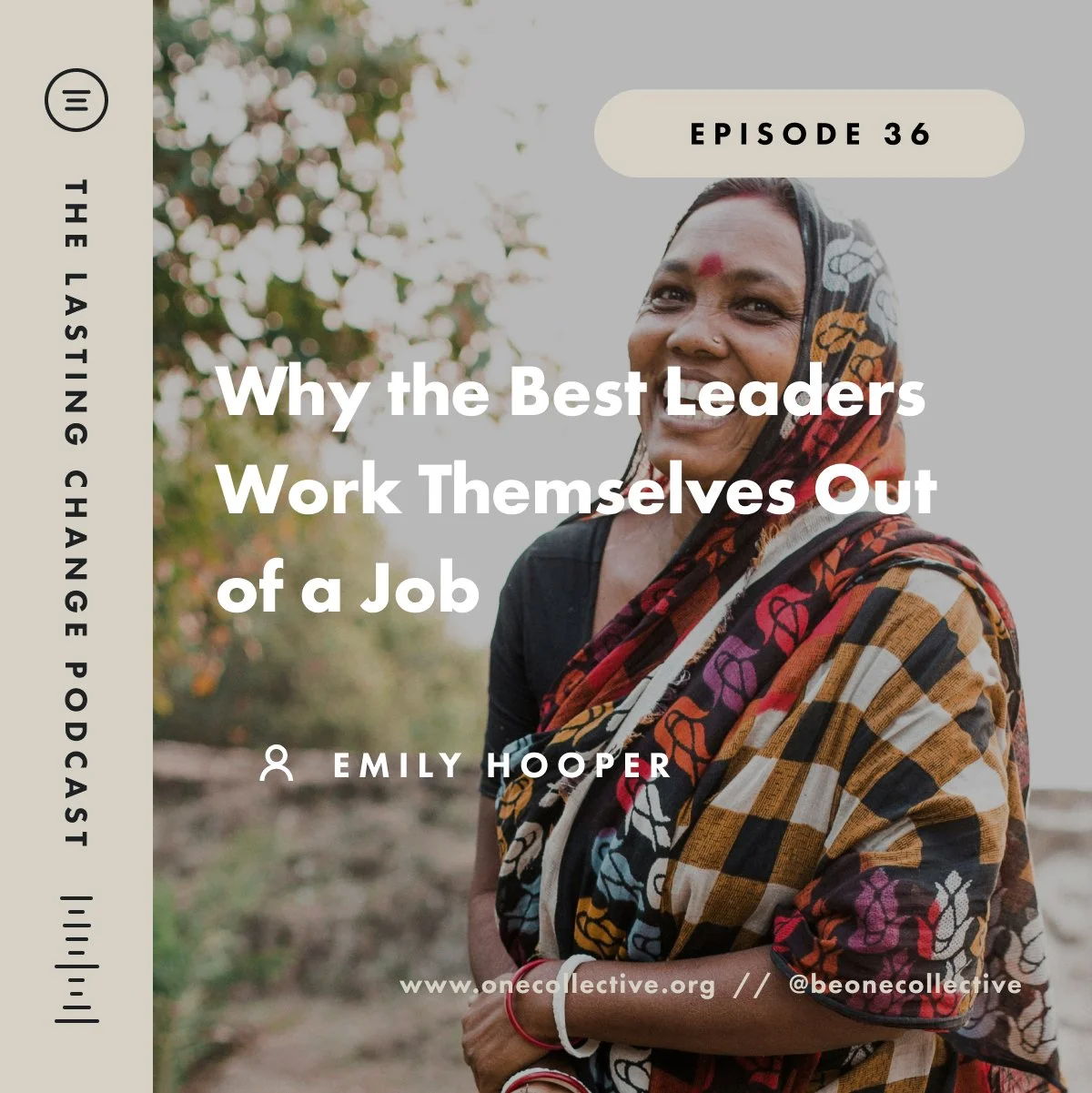#1 Integrating Faith in Your Daily Work - Michael Sherr
Episode 1 | 45 Minutes | Oct 29, 2024
What does it look like when faith informs not just beliefs but the way someone teaches, counsels, and leads?
In this episode of Innovate for Good, Dr. Michael Sherr, Associate Dean and Professor of Social Work at Cedarville University, shares how his faith shapes his approach to teaching, counseling, and leading. You’ll gain practical insights on bringing your whole self to work, navigating challenges with resilience, and staying grounded in purpose and faith. Whether you’re in healthcare, education, or any helping profession, Dr. Sherr’s story offers down-to-earth advice on integrating faith with work in a way that’s authentic, impactful, and deeply fulfilling.
In this Episode You’ll Learn:
Practical ways to integrate faith authentically into your work, regardless of your profession.
How to bring your whole self to work and navigate challenges with resilience and purpose.
The unique role of faith in professions that serve others, like healthcare and education.
Dr. Sherr’s personal strategies for staying grounded and fulfilled amidst career demands.
How a faith-centered approach can enhance your impact on those you serve.
-
Dr. Michael Sherr is the Associate Dean and Professor of Social Work at Cedarville University, where he brings decades of experience in social work, research, and education. A Jewish believer who came to faith in Jesus as a young adult, Dr. Sherr’s journey informs his work as an educator and mentor. He has authored over 80 publications, including four books, with his fifth, Scripture and Scrubs: A Christian Calling to Healthcare, releasing soon. As the editor-in-chief of two scholarly journals, Dr. Sherr is passionate about guiding the next generation of social workers and healthcare professionals to integrate faith with practice in a way that is both authentic and impactful.
-
Carly Fortosis: Welcome to the Innovate for Good podcast with One Collective. This is a podcast where we chat with educators who are making a difference in their fields. My name is Carly Fortosis, and I’m here with my coworker and fellow One Collective serving coach, Mark Fasshager. Today, we are joined by Dr. Michael Sherr.
Mark Fasshager: Dr. Sherr serves as Associate Dean and Professor of Social Work at Cedarville University in Ohio. He’s also the editor-in-chief of two scholarly journals, The Journal of Human Behavior in the Social Environment and Home Healthcare Services Quarterly. Dr. Sherr has 80 publications, including four books, with a fifth releasing early next year titled Scripture and Scrubs: A Christian Calling to Healthcare. It’s a big part of his story. Thank you so much for joining us, Dr. Sherr.
Dr. Michael Sherr: Thank you, Mark. Thanks for having me.
Carly Fortosis: As Mark mentioned, you come from a Jewish background, and you’ve shared with us that it was quite conservative. Can you talk about how that influenced you, especially in your journey to embrace Jesus?
Dr. Michael Sherr: Sure. When we talk about “conservative” in the Jewish world, it can mean something different from how Christians or Protestants interpret it. Generally, there are three broad categories in American Judaism. Reform Judaism is more liberal and progressive, with female rabbis, for instance. Conservative Judaism sits between Reform and Orthodox; Orthodox is the most traditional, where men and women don’t sit together, and women wear head coverings.
I grew up in a large, patriarchal Jewish family that immigrated from Germany and Austria. I went to Hebrew school for ten years on Long Island, New York. I wasn’t a great student and got into a lot of trouble. In Hebrew school, they separated us into groups: one for those who were expected to become rabbis and another for those who might go into more common professions. I was in the back of that second class, always causing problems, questioning everything.
Fast forward—I married young at 19 to a woman who was a believer in Jesus Christ. Coming from a family with a lot of strife and inner conflict, I saw something different in her family. They didn’t have much financially, but they had peace and joy. She didn’t “Bible thump,” but I could see her faith in action. When my mother became ill and later passed away, it raised big questions for me. I wondered, “Is God real?” She bought me my first Bible, and I began reading it every day. That’s been my anchor.
Mark Fasshager: Coming to faith in Jesus sounds like it required a conscious rejection of your upbringing. Did you feel that way?
Dr. Michael Sherr: Yes, it did. I believe God makes the first move in drawing us to Him. For me, it’s a constant reflection: Is my faith real? If it is, it must take preeminence in my life, as Colossians 1 says. That affects everything I do. Even when I preach or interact with colleagues, I want to know if it’s real for them, too, or just a religious practice. That cost me many relationships early on. Embracing Jesus was not only about freedom in grace but also about giving up everything for truth.
Carly Fortosis: I love how you talk about “is it real?” You wrote about this in your book on becoming a Christian educator in social work, and it struck me. Can you tell us more about that?
Dr. Michael Sherr: Sure. I was finishing my PhD at the University of South Carolina, and I had a lot of pride. I knew I was good at research, writing, and statistical analysis. I helped students finish their PhDs. I was at a conference facilitating a discussion with professors about faith and learning, and an undergraduate student in the room started crying. She shared that a classmate had recently died, and her professors hadn’t taken time to grieve with the students, simply referring them to the chapel.
Hearing her story humbled me. Here I was, new to the Christian world, realizing that even those raised in the church could miss the mark. I didn’t want to spend my life as a professor thinking I was a good Christian educator only to be seen as disconnected. That moment launched me into five years of research on integrating faith and learning in the classroom.
Mark Fasshager: So, that moment sparked a whole research project?
Dr. Michael Sherr: Yes, five years of research. When I began at Baylor University, I received a grant to study whether faculty were following Wesleyan principles. I wanted to develop a tool for faculty to assess their development as Christian educators. But there was concern at the university that this tool could be used to evaluate faculty performance, infringing on academic freedom. Ultimately, I chose not to pursue the study in that way, but I wrote a book on it instead.
Carly Fortosis: That’s impressive. The level of commitment you bring to this is unique. It’s easy to fall into comfort in academia, yet you push for more.
Dr. Michael Sherr: Academia, even in Christian universities, often incentivizes self-promotion. There’s pressure to publish and build a reputation, which can become an idol. For me, my focus is integrating faith into every facet of life—not just checking boxes. When students see authenticity in faculty, it leaves an impact.
Mark Fasshager: I’m curious—how do you integrate faith with your students practically?
Dr. Michael Sherr: Integration happens naturally. I bring my walk with God into the classroom authentically, not as a “Sunday best.” There are assignments in some classes where students open scripture and think through issues, but it’s not just an academic exercise. My own approach is organic; I spend time in God’s word not because of obligation but because it grounds me. I want my students to experience that as well, especially if they’ve grown up with scripture as just another area of study.
Carly Fortosis: I relate to that—breaking free from the sense of obligation to read the Bible. Experiencing a genuine thirst for scripture has changed everything for me.
Dr. Michael Sherr: Yes, absolutely. In Judaism, there’s a prayer for everything. You’re always following rules. Why would I put myself under that when I’m living under grace? There’s freedom in that, and it’s transformative.
Mark Fasshager: Let’s talk about your upcoming book, Scripture and Scrubs: A Christian Calling to Healthcare. You ask if it makes a difference if healthcare providers are Christian. Why does that matter?
Dr. Michael Sherr: That’s a central question in the book. Healthcare professionals deal with life-and-death situations daily. Should it matter if a person taking your blood is a Christian? Yes, because they represent God’s grace in those moments. Healthcare workers remind people of their mortality, often serving as “deacons of society.” They may be the closest encounter some people have with Christ. So, yes, faith matters in those interactions.
Carly Fortosis: What is the purpose of the Christian healthcare worker, according to scripture?
Dr. Michael Sherr: To point everyone toward eternal glory and provide evidence that God is real. In practical terms, scripture teaches behaviors like comforting others, offering forgiveness, and enduring challenges daily as vessels of God’s light. That’s how we show up every day without burning out.
Mark Fasshager: Would you say this applies beyond healthcare to other Christian helpers in the world?
Dr. Michael Sherr: Absolutely. These principles apply to all Christians, but healthcare professionals are on the frontlines. They see people’s deepest pain and struggle. It’s why a strong, authentic relationship with God is essential—it can’t be shallow when you’re on the frontlines.
Carly Fortosis: What practical strategies do you suggest for staying grounded in faith?
Dr. Michael Sherr: Nothing groundbreaking, but essential. Commit to ongoing training—both professionally and spiritually. Be active in prayer. I encourage my clients to pray regularly, truly connecting with God. Also, maintain perspective—our job is to abide, not strive. When overwhelmed, remember it’s God’s work, not ours. And rest—take breaks, and surround yourself with fellow believers who can speak truth into your life.
Mark Fasshager: Your advice resonates deeply. A strong faith community can make a huge difference.
Dr. Michael Sherr: Absolutely. My men’s discipleship group is a lifeline. We hold each other accountable, grounded in the truth. Christian fellowship, mission work, and balancing work with rest are all crucial.
Carly Fortosis: Thank you so much, Dr. Sherr. Can you tell us when your book will be released?
Dr. Michael Sherr: It’s expected in January 2025, so just a few months away. Scripture and Scrubs: A Christian Calling to Healthcare will be available where books are sold.
Mark Fasshager: We’re grateful for your time and insights, Dr. Sherr. Your work and commitment to integrating faith with education are inspiring.
Dr. Michael Sherr: Thank you for the opportunity to talk about what God has done in my life and what He’s capable of doing in anyone’s life. All for His glory.
Carly Fortosis: Thank you again, Dr. Sherr!
-
Scripture and Scrubs: A Christian Calling to Healthcare by Dr. Michael Sherr (Coming January 2025)
Book Recommendation: Emotionally Healthy Spirituality by Peter Scazzero




